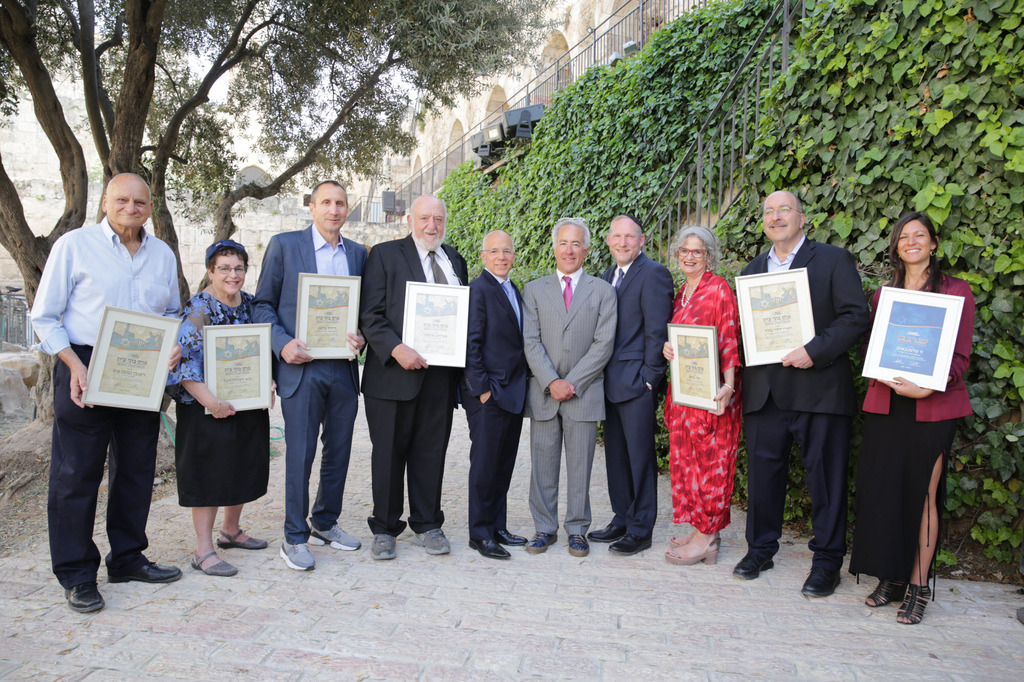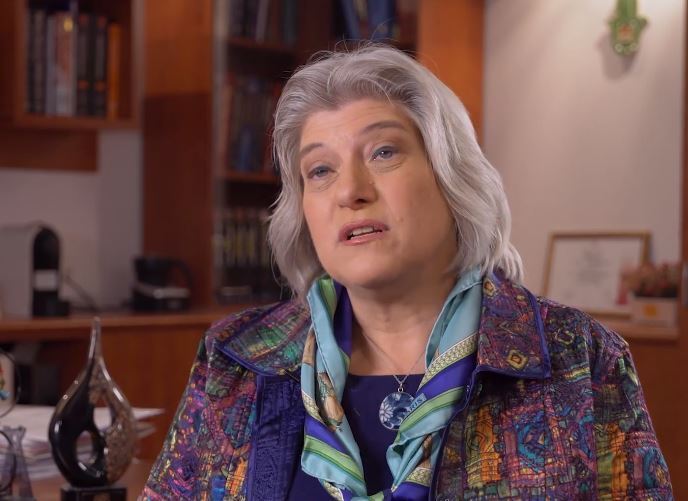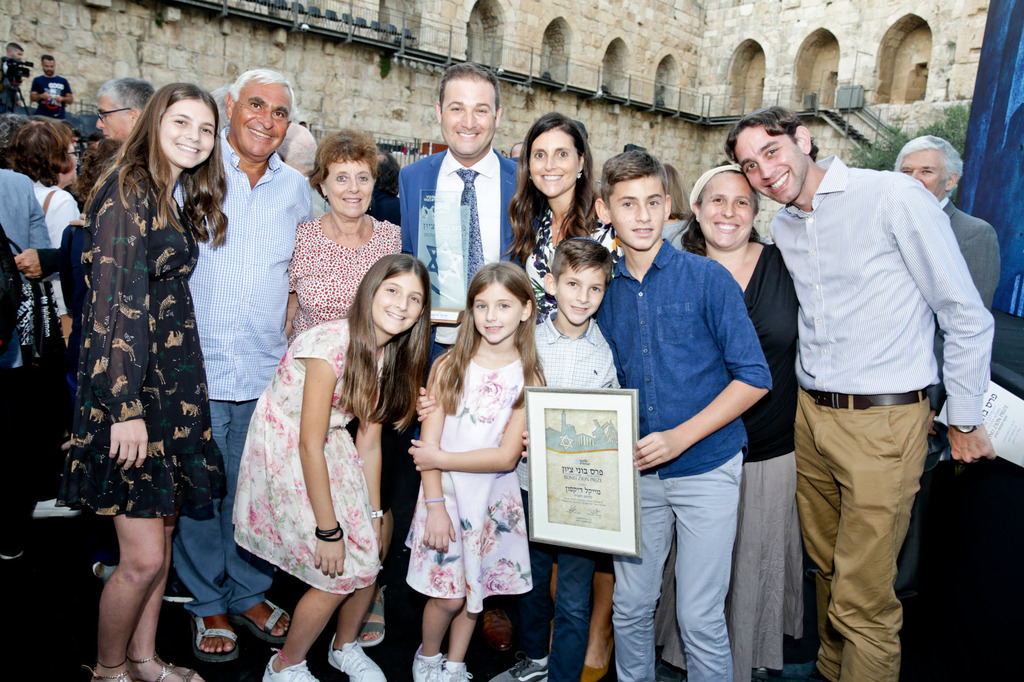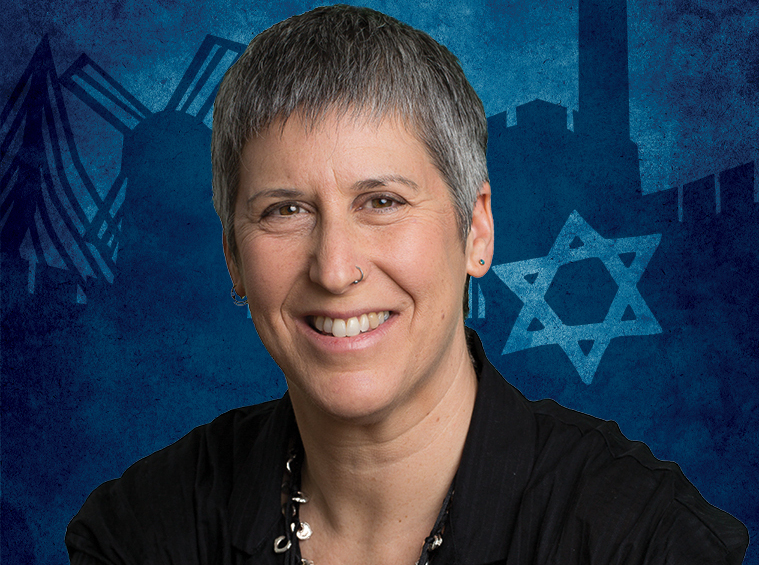A doctor who paved the way for women's medicine in Israel, an educator who trains Israeli diplomats and future leaders, and a mother of a child with Down syndrome who works to integrate children with special needs – this is the story of three Bonei Zion Prize recipients – all new immigrants, doing groundbreaking work in their fields, whose immigration to Israel affects us all.
Tens of thousands of new immigrants move to Israel every year, each with their own personal story. However, there are those whose immigration shapes and affects many other people's lives.
We met three new immigrants, whose work and achievements are shaping the image of the State of Israel: Prof. Marcia Javitt, Director of the Department of Radiology at Rambam Medical Center, a pioneer in the field of radiology and women's medicine; Michael Dickson, executive director of StandWithUs Israel, who has trained dozens of leaders and diplomats over the past 15 years; and Beth Steinberg, who founded a large volunteer organization to integrate children with special needs.
The contributions of Javitt, Dickson and Steinberg earned them the Sylvan Adams Nefesh B’Nefesh Bonei Zion Prize.
The prize has been given over the past seven years to immigrants from English-speaking countries in recognition of their achievements in the fields of science, medicine, non-profit activities and more. In addition, a Lifetime Achievement Award is bestowed as a well as a Young Leadership award for immigrants under 35 years old.
'In Israel I do significant things'
When Prof. Marcia Javitt's husband first came up with the idea of immigrating to Israel, she was taken by surprise.
"We are devout Zionists and I understood why this was important to you, but I am at the peak of my career, I did not serve in the military, and I have no connections in academia in Israel,” she said to him. She didn't understand what she would do in the country, she recalls.
No one - not even Prof. Javitt herself - believed that a few years later, she would be the one who would make Aliyah before her husband, a surgeon by profession.
It all began with a random meeting with a colleague during the Passover holiday in Jerusalem eight years ago. Her colleague mentioned to her that a Radiology department director’s position opened in Rambam Healthcare Campus, the largest hospital in northern Israel, and he pushed her to apply.
She applied without expectations, and to her surprise - got the job. She did not have much time to prepare. Within weeks she went through an accelerated immigration process. The day after she landed in Israel in 2014, she started working at Rambam.
“Everything happened so fast, but I knew it was the right thing to do. I have no way to explain it- it just felt like I came home.”
(Prof. Marcia Javitt of Rambam hospital)
Prof. Javitt, who has an impressive history of managing large wards in hospitals in Washington and Philadelphia, is world-renowned in radiology and is considered one of the founders of Women's Imaging in Radiology.
"Women's imaging is everything that has to do with using imaging in women's health," she explains.
"There are unique medical issues for women, and it requires specific experience and knowledge. In recent years, the field has become more organized, and all the most interesting technologies have begun being developed in the field.”
She was born in New York to an immigrant father from Russia and a mother born in the United States. As a child, her father fell ill with Parkinson's disease. Her mother took on the role of the main breadwinner.
Javitt says: “Almost unheard of in the early 1960s, my mother was a company manager. She always told me that in order to succeed in the world, you have to think like a man and act like a woman."
Javitt grew up in a Zionist Jewish home, but the family could not afford to send the children to a Jewish school - "that's why I don't have good Hebrew," she says.
Contrary to her initial concerns, since she made Aliyah, Prof. Javitt has made greater achievements than ever before: she initiated innovative research for targeted treatment of prostate cancer, developed a new program for detecting breast cancer without ionizing radiation, and also founded the Rambam Point of Care Ultrasound Learning Center.
In addition, she edits international scientific journals, writes textbooks, and has won awards for excellence in radiology. The most important achievement, for her, is teaching - she also serves as a lecturer to medical students at the Technion.
"These achievements could not have happened so quickly in the United States. Rambam has many excellent physicians in all subspecialties who are every bit as qualified and professional when compared to those in the United States. People here are just as meticulous, but they work a lot harder. I have lived in Israel for six years and feel that I am doing more meaningful things than ever before."
Make Israelis better leaders
The work of Michael Dickson (43), for Israel and for the Jewish people, which began in London where he was born and raised, reached new heights upon immigrating to Israel. In London he was active in the Jewish community, serving as Director of Informal Jewish Education at the Jews’ Free School (JFS), the largest and oldest Jewish educational institution in the world.
(Michael Dickson of StandWithUs)
As a result of one of the educational activities at the school, he contacted the pro-Israel organization StandWithUs to receive informative materials about Israel, which led to a fruitful cooperation over the years.
When Dickson decided to make Aliyah fifteen years ago, the organization hired him to establish and grow a StandWithUs branch in Israel.
"The idea was to work with students and tourists, who would not only experience Israel, but could also go home and explain to people about the country. Deal with the hard questions."
In the summer of 2006, at the end of the Second Lebanon War, Dickson landed in Israel with his wife and two young children (the couple now have five children).
"At the time, I was interviewed by two UK newspapers and asked why a British guy would want to live in a war zone," he recalled.
He describes his arrival to Israel, describing an unforgettable situation from his early days in Israel: "My oldest daughter was two and a half years old at the time. One day, when I came to pick her up from kindergarten, she had a crown on her head with a Star of David on it. We were walking down the street, and I thought to myself, in London I wouldn't feel comfortable walking around like this. Here it was so natural."
Since he began his job, the Israeli branch of the Los Angeles-founded organization has grown to become an international center.
StandWithUs was one of the first of similar orgs to invest in Israel education awareness on social networks in the mid-2000s.
"Today we reach millions of people, even from the Arab world. We get messages from people from the Palestinian Authority and Iran telling us they support Israel," he says, his eyes lighting up.
When asked: "What does Israel represent to you?" Dickson replies without thinking twice: resilience.
He even wrote a book about it, ISResilience – What Israelis Can Teach The World - which was published several months ago (with psychologist Dr. Naomi Baum).
"In the 15 years I have been in Israel, I have discovered how strong Israelis are, how they bounce back quickly after terrorist attacks and wars. Now, during the coronavirus period, resilience is the key word, and the world has much to learn from Israelis. In the book, we explore the issue of resilience through the story of Israelis of a diversity of backgrounds. In September, we will participate in a large international conference of experts, to talk about Israeli resilience."
Do you yourself feel Israeli?
"Yes, absolutely. Although I still have British manners and I still drink tea with milk - I also barbecue on Israeli Independence Day. From the minute I arrived in Israel, I felt like I had returned home. Being Israeli is a part of who we are. And immigrants bring wonderful things with them to Israel, we all have something to contribute".
Innovation, entrepreneurship and immigration
The Aliyah story of Beth Steinberg (59) is the story of a late bloomer, whose leadership and entrepreneurial abilities were discovered in her mid-40s, after immigrating to Israel. Beth grew up in Long Island, is married with three sons, the youngest of which, Akiva - now 24 - has Down syndrome and autism.
"When Akiva was born, I was sure I missed the chance to make Aliyah. All my family members had already made Aliyah in the '80s and '90s, we're the last ones left in the United States."
The final decision to make Aliyah came in 2005.
"We arrived at my little sister's wedding in Israel, and it was very difficult for me to come back, to know that I would not be close to her, and that I would not see her have children. I felt something was missing in my life. That's when I realized it was time for us to come to Israel and be with the family."
Immigrating to Israel with a child with special needs is not an easy challenge, says Steinberg, and admits that the rapid adjustment to life in Israel was a surprise.
"We were afraid that Akiva would not find a framework like there was in New York, but we found that in Israel the service is just as good, and that the attitude here is much more intimate and caring. Luckily, our whole family was already here, and we've had a lot of support. Maybe I acclimated quickly because I was already a mature woman with experience, I knew how to make things work, I knew how to ask for help".
The family settled in Jerusalem, and their integration was swift. In preparation for the first summer vacation in Israel, when Steinberg realized that there was no suitable framework for summer camps for children like Akiva, she initiated one with several mothers, including Miriam Avraham, an immigrant from New York, who would later become her partner.
A group of women organized a two-week summer camp which gained momentum. Within a few years, the local initiative became an influential organization, which works extensively with children and adolescents with special needs.
Today, Shutaf Inclusion Programs in Jerusalem offers inclusive, informal education programs for children, teens, and young adults.
Approximately 300 participants aged 6 to 23 enjoy integrated activities throughout the year: camps during Hanukkah holidays, Passover and during the summer, a young leadership program for youth and young adults, interactive workshops about integration, and parental meetings
"We have activities and programs for children and adolescents with a wide range of disabilities, learning problems, behavior or mental health challenges. Every child has their challenges and needs, we don't care about the diagnosis - every new kid who joins us, we conduct a home visit and we get to know the parents and the family in order to give a suitable support system for each child."
How do you explain “the late bloom” that happened to you after immigrating to Israel?
"I have a feeling that innovation and immigration are closely related. You disconnect from your old place, come to a new place, and try to find yourself. It was only in Israel that I felt that I had opened myself up to new opportunities, and new skills."





